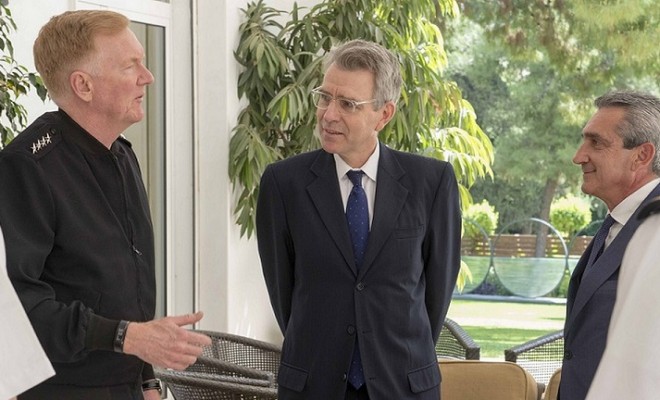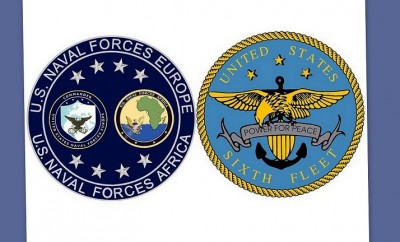
Adm. Foggo Visits Greece, Strengthens Partnership
Adm. James G. Foggo III, commander, U.S. Naval Forces Europe-Africa and commander, Allied Joint Force Command Naples, Italy, completed a two-day trip to Athens, Greece, where he met with senior military leaders and civilian officials further strengthening the vital U.S.-Greece partnership May 10-11, 2018.
Upon arrival in Athens, Foggo traveled to the residence of U.S. Ambassador to Greece Geoffrey Pyatt. Pyatt hosted a lunch meeting with local leaders, educators, media executives and government officials who shared their thoughts on issues of strategic importance to the United States, Greece and the region.
After the lunch meeting, Foggo and his team traveled to the largest naval base in Greece, Salamis Naval Base, where he was greeted with military honors by the Hellenic Navy before meeting with Vice Adm. Ioannis Pavlopoulos, commander in charge of the Hellenic Fleet. During an office call the leaders discussed the strong bilateral defense relationship between our two nations and the importance of military-to-military relationships.
“I am delighted to be back in Greece again,” said Foggo. “This is my first time in Salamis, a place that is very historic. The Greek navy has lived a great tradition of maritime presence and maritime operations.”
Hellenic sailors then provided Foggo with a tour of the base, a demonstration of their submarine simulator, and tours of a 214-class submarine and Vosper-class fast patrol boat.
While at Salamis, Foggo participated in an interview with the Hellenic Ministry of Defence show “Areti kai Tolmi,” which means valor and boldness. Foggo remarked on his previous time in the region and the strategic importance of the Hellenic Navy to the NATO mission.
“When I first came to the Mediterranean as a one star admiral, things were not this busy,” said Foggo. “There was not a Russian submarine in the Mediterranean. Today there are many…A lot of naval forces maneuvering around and so it is important as an alliance that we maintain a very robust power-projection capability in order to deter and protect our interests. We thank Greece and the Greek navy for all that you do in support of that maritime strategy.”
“I walked around the base and I find that it is an exceptional facility,” Foggo continued. “I am very glad that you are partners and allies and members of NATO, and friends. I just had an opportunity to go down on one of the Hellenic class-214 submarines — absolutely spectacular. I am a submariner so this was very special for me. I toured your submarine facility and submarine school and saw the way things were back after the second World War in one of the original trainers which is being restored. I think that it’s very important that we remember our history.”
The next morning Foggo traveled to the Hellenic National Defence General Staff Premises (HNDGS), where he was again greeted with honors. While there, Foggo was briefed by HNDGS directors, toured the operations center, and met with senior officials including the Minister of Defence, the Chief of HNDGS Adm. Evangelos Apostolakis, and the Chief of the Hellenic Navy General Staff Vice Adm. Nikolaos Tsounis.
“If we look at the scenario today,” said Foggo. “ There are a lot of other nations or non-state actors who are playing roles in the in the Eastern Mediterranean and Levant which are destabilizing it. You mix all that with transportation of ships, both legal and illegal trafficking, the potential for terrorist activity on the high seas; the potential for interaction between Russian forces, Syrian forces, NATO forces and American Forces … this is a very volatile cocktail and it has raised tension in the region of the Eastern Mediterranean, which is why it is so important for the Hellenic Navy to be as strong as it is,” said Foggo. “Our relationship has never been better between Greece and the United States, and certainly between the Hellenic Navy and other NATO nations.”
U.S. Naval Forces Europe-Africa, headquartered in Naples, oversees joint and naval operations, often in concert with allied and interagency partners, to enable enduring relationships and increase vigilance and resilience in Europe and Africa.




